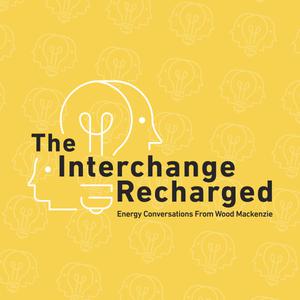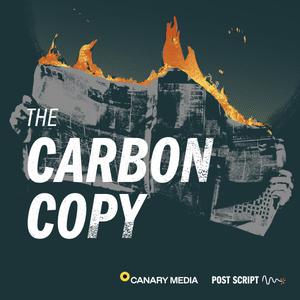
My Climate Journey
Jason Jacobs
A growing body of knowledge about climate change and potential solutions. This series traverses disciplines, industries, and opinions with hundreds of deep-dive conversations with science, technology, and climate leaders. Hosted by Jason Jacobs and Cody Simms.
- 1 hour 14 minutesExploring NOAA with Chief Scientist Dr. Sarah Kapnick
Dr. Sarah Kapnick serves as the Chief Scientist at NOAA, the National Oceanic and Atmospheric Administration, which plays a critical role in understanding and predicting changes in climate, weather, oceans, and coasts. Bringing a unique mix of science and finance to NOAA, Dr. Kapnick's background includes a stint as a senior climate scientist at JP Morgan Chase, a leadership role at NOAA's Geophysical Fluid Dynamics Laboratory, and an early career in investment banking at Goldman Sachs. She holds a PhD in Atmospheric and Oceanic Sciences from UCLA and an AB in Mathematics from Princeton.
In our conversation, Dr. Kapnick touches on a wide range of topics, including NOAA's extensive work, the importance of resilience and adaptation in today's changing climate, and the challenges of planning for a future that deviates from past assumptions of a stable climate. Highlighting NOAA's efforts in supporting community resilience and innovation, she underscores the agency's commitment to aiding stakeholders in navigating the complexities of our evolving environmental landscape, emphasizing the critical need for investment and focus on adaptation for the remainder of the 21st century.
In this episode, we cover:
- [03:08]: An overview of NOAA and its departments, focusing on climate, weather, ocean, and coasts
- [05:16]: The six line offices within NOAA, including the National Weather Service and Oceanic Research
- [09:26]: NOAA's management of marine resources and the Great Lakes
- [12:18]: How scientific priorities are set within NOAA, driven by mission and funding
- [15:06]: Kapnick's background in climate science and finance
- [20:23]: The intersection of climate change and finance
- [22:45] The need for bipartisan support for resiliency and adaptation measures
- [31:13]: NOAA's role in funding and supporting coastal resilience and climate-ready fisheries
- [36:34]: NOAA's focus on adaptation and resilience in response to climate change
- [48:19]: Opportunities for startup innovation and government funding in adaptation and resiliency
- [54:00]: The state of the world's ocean and atmospheric circulation, including AMOC slowdown
- [59:17]: Climate change impacts on the Midwest and the variability of the Great Lakes
Episode recorded on Mar 13, 2024 (Published on Apr 15, 2024)
Get connected with MCJ:
*If you liked this episode, please consider giving us a review! You can also reach us via email at [email protected], where we encourage you to share your feedback on episodes and suggestions for future topics or guests.
15 April 2024, 9:00 am - 42 minutes 54 secondsClimate Change and Democracy with Ning Mosberger-Tang
Ning Mosberger-Tang is the founder and president at 1.5 Climate Strategies Group, alongside a host of other climate and civic organizations.
As one of the pioneering female engineers at Google, Ning played a crucial role in the development of Google's initial advertising platform. Transitioning from Google in 2006, her focus shifted towards combating climate change. Presently, she spearheads multiple organizations dedicated to instigating change.
This discussion spans her endeavors in political and electoral advocacy, civic engagement, and climate tech investing. With the 2024 election on the horizon, the opportunity to converse with Ning offered invaluable insights into the critical issues at stake, her priorities for the election cycle, and her strategic approach.
Episode recorded on Mar 19, 2024 (Published on Apr 8, 2024)
In this episode, we cover:
- [01:47]: Ning's background, her experience at Google and transition to climate advocacy
- [06:28]: Founding Innovo Foundation for conservation work and climate change mitigation
- [07:23]: Ning's various initiatives, from tech investments to democracy reform
- [10:00]: The importance of policy and electoral work for climate action after the 2016 election
- [11:23]: Starting Blue Wave Postcard Movement to increase voter turnout
- [16:27]: 1.5 Climate Strategies Group's mission and member pledge
- [19:16]: Supporting investigative reporting on climate via Capital & Main and Grist
- [20:20]: Focus on the 2024 elections for climate policy impact
- [24:25]: Importance of state and local elections for climate action implementation
- [29:39]: Ning's wishlist for future climate policies, highlighting the need for transmission reform
- [30:20]: Deep dive on 501(c)(3) vs. 501(c)(4), PAC money, and the many ways elections are funded
- [35:00]: The importance of building a strong ground game for elections
- [39:47]: Ning's invitation to join 1.5 Climate Strategies Group
- [40:06]: The Blue Wave Postcard Movement's effort to register voters in Pennsylvania
- [40:59]: Oath.vote and closing words
Get connected with MCJ:
*If you liked this episode, please consider giving us a review! You can also reach us via email at [email protected], where we encourage you to share your feedback on episodes and suggestions for future topics or guests.
8 April 2024, 9:00 am - 46 minutes 56 secondsDiving into Desalination with Peter Fiske, National Alliance for Water Innovation
Dr. Peter Fiske is the Executive Director at the National Alliance for Water Innovation or NAWI. NAWI is a collection of 19 universities, four national labs and 190 plus US water companies committed to developing new technologies to enable distributed desalination and water reuse. They're a five-year, $110 million research program supported by the US Department of Energy in partnership with the California Department of Water Resources and the California State Water Resources Control Board. They're headquartered at Lawrence Berkeley National Lab in Northern California. Peter joined Berkeley lab in 2017. Prior to that, he was the Chief Executive Officer at Pax Water Technologies from 2008 until January 2017, when it was acquired by UGSI Incorporated. Peter holds a PhD in geochemistry and material science from Stanford and an MBA from the UC Berkeley Haas School of Business.
Our conversation today starts with a deep dive into desalination before broadening out into Peter's vision for our water system. Shout-out to former podcast guest Tom Ferguson at Burnt Island Ventures for connecting us with Peter. We've been wanting to learn about desalination and Peter helps us gain a much better understanding of that and so much more.
In this episode, we cover:
- [3:11] Peter's work at the National Alliance for Water Innovation (NAWI)
- [5:56] Overview of desalination and its various applications, including ocean desalination and water reuse
- [9:19] Desalination challenges and opportunities, including energy usage and brine disposal
- [14:33] Small-scale desalination systems and water reuse in buildings and cities
- [20:09] The water-energy nexus and the impact of water usage on power generation
- [27:30] NAWI's ongoing projects, including ultra high recovery desalination and recovery of valuable materials from wastewater
- [32:16] Status of water innovation in the U.S. and other countries
- [34:43] Water economics and the need for companies to consider their consumption
- [36:49] The federal policy landscape for water in the U.S.
- [38:30] Water as a national security
- [40:45] Peter's background and career
Episode recorded on March 18, 2024 (Published on April 2, 2024)
Get connected with MCJ:
*If you liked this episode, please consider giving us a review! You can also reach us via email at [email protected], where we encourage you to share your feedback on episodes and suggestions for future topics or guests.
2 April 2024, 9:00 am - 32 minutes 12 secondsStartup Series: Reclaimed Lumber with Urban Machine
Eric Law is the CEO and co-founder of Urban Machine.
Urban Machine develops robotics and AI to reclaim lumber from construction and demolition for re-use. They claim that 37 million tons of wood goes into landfills annually, and much of that wood could be reused. Their robotic machines specialize in the necessary steps to prep wood for reconditioning.
In 2022, Urban Machine successfully secured a seed funding round, spearheaded by Lower Carbon Capital and supported by GV (Google Ventures).
With a career rooted in the construction and contracting industry, Eric has extensive experience in large construction projects and has been involved in creating and selling software targeted at this sector. We start our conversation with an overview of the construction industry, highlighting the main players, their challenges, including considerations around emissions and sustainability.
The discussion touches on challenges Urban Machine aims to address, the innovative technology they employ, and their aspirations for the future.
In this episode, we cover:
- [3:08] Overview of the construction industry and its challenges, including labor shortages and sustainability concerns
- [5:52] Key stakeholders in construction
- [13:41] Urban Machine's mission to reclaim lumber from construction and demolition for reuse
- [17:91] The importance of deconstruction in reducing wood waste
- [19:30] Urban Machine's tech and processes for preparing wood for reconditioning
- [21:38] Benefits of using reclaimed lumber in construction projects
- [23:58] Economic considerations of using reclaimed lumber and competing with virgin lumber prices
- [26:19] Urban Machine's progress to-date, funding and future vision
- [30:00] Eric Law's motivation for starting the company and its positive reception from the industry
Episode recorded on Mar 14, 2024 (Published on Mar 28, 2024)
Get connected with MCJ:
*If you liked this episode, please consider giving us a review! You can also reach us via email at [email protected], where we encourage you to share your feedback on episodes and suggestions for future topics or guests.
28 March 2024, 9:00 am - 55 minutes 20 secondsFrom the White House to Climate Frontlines with Brandon Hurlbut
Brandon Hurlbut, our guest on this episode, wears multiple hats. He's co-founder at Boundary Stone Partners, a climate change focused government affairs firm created in 2013 that operates at the intersection of technology, finance, and policy.
He's also co-founder of Overture, an early stage climate tech venture capital firm that recently announced a $60 million debut fund, and he is an operating partner at NGP, a private equity fund focused on energy with billions of dollars under management. Among other activities, Brandon also serves on the board of directors of the Sunrise Movement, The Solutions Project, co-founded by Mark Ruffalo, and Clean Energy for America.
Before this, Brandon served in the Obama administration as US Department of Energy Chief of Staff, and in the White House as the president's liaison to the energy and environment cabinet agencies. At the DOE, Brandon oversaw day-to-day operations of a federal agency with a $29 billion budget and a 115,000 person workforce. He also served on the investment committee for its $38 billion Clean Energy Fund.
Cody and Brandon discuss the intersection of policy and innovation, including what his work at Boundary Stone entails and the types of problems they help companies navigate. They also delve into the 2024 US election, including what's at stake from a climate change perspective in the presidential, House, and Senate elections.
In this episode, we cover:
- [03:10]: Brandon's unified approach to merging technology, finance, and policy to combat climate change
- [05:22]: Involvement with the Sunrise Movement and The Solutions Project
- [09:52]: Transition from the Obama campaign to significant roles in energy and environment
- [14:08]: The genesis and evolution of Boundary Stone
- [21:14]: The varied advocacy work Boundary Stone undertakes to connect startups with government opportunities
- [30:31]: The high stakes of the 2024 US election for climate policy and innovation
- [34:42]: Potential climate policy directions and challenges in a post-2024 election landscape
- [40:27]: Ramifications of a potential 2024 Trump win on climate initiatives
- [43:53]: The role of Senate and House elections in shaping climate policy and legislation
- [46:13]: The bipartisan appeal of hydrogen, geothermal, and permitting reform in energy policy
- [50:38]: Brandon’s advice for getting involved ahead of the 2024 elections and beyond, including Climate Cabinet and Climate Power
Episode recorded on Mar 1, 2024 (Published on Mar 18, 2024)
Get connected with MCJ:
*If you liked this episode, please consider giving us a review! You can also reach us via email at [email protected], where we encourage you to share your feedback on episodes and suggestions for future topics or guests.
18 March 2024, 9:00 am - 1 hour 10 minutesKim Stanley Robinson on Climate, Capitalism, and the Human Condition
Kim Stanley Robinson, renowned science fiction author, is our guest on this episode of MCJ. He is the author of the Ministry for the Future, a novel which outlines humanity's attempts to navigate climate change in the coming decades.
Former President Barack Obama named the Ministry for the Future as one of his favorite books of 2020. The work has been cited by numerous entrepreneurs and builders in the MCJ member community as having had a significant impact on their interest in working on climate and decarbonization solutions. The subject of climate change shows up in many of Kim Stanley Robinson's works from his Mars trilogy, written in the 1990s about humans terraforming Mars, to his science in the capital Series from the mid 2000s, to his 2017 novel, New York 2140, which is set in a Lower Manhattan that is submerged due to sea level rise.
And it shows up in many of his other works as well. Stan, as he goes by, has won numerous awards including the Hugo Award for best novel for both Green Mars and Blue Mars, and the Nebula Award for best novel for Red Mars and his book 2312. The Atlantic has called his work the gold standard of realistic and highly literary science fiction writing. And according to an article in the New Yorker, he is generally acknowledged as one of the greatest living science fiction writers. Stan and Cody have a wide-ranging conversation about his relationship with nature, his views on capitalism, society, government and technology, and of course his writings and his views on climate change and the path ahead for us all.
In this episode, we cover:
- [03:04]: Stan's early life, finding solace in nature on the California coast
- [06:40]: Writing "The High Sierra: A Love Story" during the pandemic
- [08:57]: Noticing climate change impacts in the Sierra Nevada
- [12:08]: Climate change awareness sparked by a 1995 trip to Antarctica
- [14:13]: Mixing dread and hope in climate change discussions
- [17:36]: Viewing technology as both hardware and software
- [21:19]: Critiquing capitalism's role in power dynamics
- [26:58]: Majority's desire for a sustainable world despite hurdles
- [28:00]: Individual actions within broader societal efforts
- [30:14]: Civil disobedience as a response to failed representation
- [34:18]: The UN and other international governance's role in global challenges
- [39:18]: The potential of international treaties in climate action
- [42:11]: The concept of sudden societal change in climate action
- [48:06]: Ministry for the Future and "following the money" in climate change narratives
- [55:59]: Overview of Stan's works and current projects on Antarctica
Episode recorded on Feb 7, 2024 (Published on Mar 11, 2024)
Get connected with MCJ:
*If you liked this episode, please consider giving us a review! You can also reach us via email at [email protected], where we encourage you to share your feedback on episodes and suggestions for future topics or guests.
11 March 2024, 9:00 am - 44 minutes 19 secondsQuantum Solutions with Rigetti Computing
Subodh Kulkarni is CEO and President at Rigetti Computing, and our topic in this episode is quantum computing and its implications for our changing planet. Rigetti Computing, a publicly listed company, builds quantum computers and superconducting quantum processors. It also provides cloud-based access to quantum computing for both commercial and research purposes.
Quantum computing, a field rooted in theoretical physics, is complex and involves the use of quantum bits or qubits, which differ from binary computing's zeros and ones. As the world's computing demand continues to soar with AI and data centers consuming vast amounts of energy, AI also has the potential to unlock climate change solutions through innovations in biotech, advanced energy, planetary modeling, and more.
We wanted to learn from Subodh about how quantum computing might change the game in all of these areas as it matures. Is it possible that quantum computing is an enormous future climate solution? Let's find out.
In this episode, we cover:
- [02:39]: Subodh’s background and joining Rigetti as CEO
- [05:26]: Basics of quantum computing versus classical computing
- [09:19]: Introduction to the subatomic world
- [11:46]: Physicality of a quantum computer
- [15:01]: Rigetti's business model: cloud access and on-premise quantum computers
- [17:06]: Qubit development and the potential to follow Moore's law
- [18:02]: The power requirements of maintaining a hyper-cold environment for quantum computing
- [20:02]: Quantum computing's potential to reduce data center energy consumption
- [24:25]: Quantum's strength in probabilistic versus deterministic computation
- [29:26]: Rigetti's involvement in DOE’s fusion project
- [30:59]: Predictions for quantum computing advancements in the next 10 years
- [33:45]: How quantum computing can bolster artificial intelligence
- [36:18]: Current state of quantum computing and near-term inflection points
- [37:16]: Initial use cases for quantum computing, Rigetti’s commercialization strategies, and government funding
- [41:08]: Collaborative projects with major financial and pharmaceutical companies
- [42:12]: Potential applications in weather modeling and synthetic biology
Episode recorded on Jan 23, 2024 (Published on Mar 4, 2024)
Get connected with MCJ:
*If you liked this episode, please consider giving us a review! You can also reach us via email at [email protected], where we encourage you to share your feedback on episodes and suggestions for future topics or guests.
4 March 2024, 10:00 am - 33 minutes 38 secondsSkilled Labor Series: Eric Letvin, FEMA
This episode is part of our Skilled Labor Series hosted by MCJ partner, Yin Lu. This series is focused on amplifying the voices of folks from the skilled labor workforce, including electricians, farmers, ranchers, HVAC installers, and others who are on the front lines of rewiring our infrastructure.
Eric Letvin serves as the Federal Emergency Management Agency (FEMA)’s deputy assistant administrator for mitigation.
Eric directs FEMA's pre and post-disaster mitigation programs that support sustainable disaster resilient communities to avoid or reduce the loss of life, property and financial impacts of natural hazards. We talk about Eric's career journey, a brief history of FEMA and what the agency does before, during, and after natural hazards or disasters. We emphasize the importance of pre-disaster mitigation alongside talking about a new tranche of funding from the Infrastructure Bill going to support the work here.
In this episode, we cover:
- [01:37]: Eric's role at FEMA and career path from engineering to hazard mitigation
- [03:43]: FEMA's inception, evolution, and mission within DHS
- [05:35]: Hazard mitigation vs. resilience outcomes
- [06:29]: FEMA's expanded role in non-natural disaster management
- [09:05]: Pre and post-disaster flood mitigation strategies and grant programs
- [11:38]: Wildfire mitigation efforts and challenges amplified by climate change
- [14:55]: FEMA's operational structure and budgeting for disaster relief and mitigation
- [17:06]: Bipartisan Infrastructure Law funds for resilience efforts
- [19:03]: Examples of funded projects in disadvantaged communities
- [20:17]: The significance of FEMA's Flood Mitigation Assistance program in the face of climate change
- [22:56]: Advances in flood mapping technology and risk communication
- [24:40]: Challenges in modeling wildfire risk and the dynamic nature of wildfire hazards
- [26:34]: The importance of building codes in disaster readiness
- [28:59]: The shift towards prioritizing pre-disaster mitigation funding
- [30:00]: Lessons from past disasters on the value of proactive mitigation
Resources mentioned:
Episode recorded on Nov 16, 2023 (Published on Feb 29, 2024)
Get connected with MCJ:
*If you liked this episode, please consider giving us a review! You can also reach us via email at [email protected], where we encourage you to share your feedback on episodes and suggestions for future topics or guests.
29 February 2024, 10:00 am - 50 minutes 26 secondsNavigating Climate Emotions with Dr. Britt Wray
Dr. Britt Wray is a science communicator and the author of two books. Her latest is Generation Dread: Finding Purpose in an Age of Climate Anxiety, which is a national bestseller. Dr. Wray is also the director of CIRCLE (Community-minded Interventions for Resilience, Climate Leadership, and Emotional wellbeing) at Stanford Psychiatry, a research and action initiative in the Stanford School of Medicine. Her first book, the Rise of the Necrofauna: The Science, Ethics, and Risks of De-Extinction was named a best book of 2017 by the New Yorker. She most recently is a top award winner of the Eric and Wendy Schmidt Awards for Excellence in Science Communications, which was bestowed upon her by the National Academies in partnership with Schmidt Futures.
Climate change evokes a myriad of emotions unique to each individual. It can stir outrage in some, sadness in others, a sense of helplessness for some, and dread for the future in others. There is no universally right or wrong reaction, as our responses are shaped by our distinct relationships with the world and the diverse circumstances in which we live. The perception of climate change varies; for some, it may feel abstract, while for others, the impacts are undeniably profound and far-reaching.
But as Dr. Wray points out, we know that climate change as we are experiencing it is anthropogenic, meaning it's the result of human behavior. And yet so little has been studied about the human behavioral response to climate change. How do we individually and collectively feel about climate change, and what do those feelings drive us to do? This is the sweet spot of Britt's work.
In this episode, we cover:
- An overview of Dr. Wray's research on climate distress
- Her work as the Director of CIRCLE (Community-minded Interventions for Resilience, Climate Leadership, and Emotional Wellbeing) at Stanford Psychiatry
- An overview of climate anxiety and its impact on people
- The concept of solastalgia and broken record, record breaking
- The importance of community and social connections in addressing climate anxiety
- The need for evaluation and evidence-based interventions for climate anxiety
- Including behavioralists and psychologists when addressing climate change
- The potential role of guilt in motivating action on climate change
- The impact of climate change on reproductive decisions and parenting
- Dr. Wray's book and newsletter
- The importance of open and vulnerable conversations about climate change
Episode recorded on Jan 29, 2024 (Published on Feb 26, 2024)
Get connected with MCJ:
*If you liked this episode, please consider giving us a review! You can also reach us via email at [email protected], where we encourage you to share your feedback on episodes and suggestions for future topics or guests.
26 February 2024, 10:00 am - 54 minutes 41 secondsExploring Material Science Startups with SOSV
On this episode of My Climate Journey, we have two guests: Susan Schofer and Po Bronson.
Susan is partner at SOSV and Chief Science Officer at Hax, which is SOSV's initiative around hard tech. She has a PhD in chemistry from Caltech, and most recently spent eight years at Modern Meadow, a growth stage startup in the bio leather space.
Po is general partner at SOSV, and managing director of IndieBio, which is SOSV's initiative around biotech. Po has written seven New York Times bestsellers, and has won nine national awards for science journalism.
Cody and our guests cover Susan and Po's backgrounds, the challenges in evaluating material science startups, their journeys from academia and the food industry, and early-stage deep tech investment models. They also discuss business economics in material science startups, scaling challenges, sustainable sourcing, and the potential and limitations of synthetic biology in the context of material science startups.
In this episode, we cover:
- [02:01]: Susan and Po’s roles at SOSV
- [03:08]: The complexity of evaluating material science startups
- [04:49]: Susan's journey from chemistry academia to industry
- [07:13]: Po's transition from the food industry and writing to IndieBio
- [09:12]: Comparing Hax's and IndieBio's methodologies within SOSV
- [11:54]: SOSV's early-stage deep tech investment model
- [14:46]: Business economics in material science startups
- [17:11]: Unmet needs and sustainable sourcing in materials
- [19:48]: The critical role of performance in bio-based materials
- [22:22]: Scaling challenges in sustainable startups
- [24:08]: “Pure” vs. blended materials
- [30:54]: Scaling issues faced by bioleather companies
- [34:35]: Trends in the plastics space and circularity
- [37:15]: Challenges in the cosmetics and skincare industry
- [41:47]: Defining terms “biomanufacturing,” “bioeconomy,” and “synthetic biology”
- [45:07]: Challenges in biology vs. chemistry
- [51:35]: Susan and Po’s advice for founders
Episode recorded on Jan 16, 2024 (Published on Feb 20, 2024)
Get connected with MCJ:
*If you liked this episode, please consider giving us a review! You can also reach us via email at [email protected], where we encourage you to share your feedback on episodes and suggestions for future topics or guests.
22 February 2024, 10:00 am - 40 minutes 31 secondsStartup Series: Residential Geothermal with Dandelion Energy
Dan Yates is the CEO and Chairman of Dandelion Energy, a Series B Stage startup deploying solutions for residential geothermal energy.
As Dan explains it, residential geothermal distinguishes itself from utility-scale geothermal by not aiming to exploit a scarce, underground heat source for electricity generation through turbines. Instead, the process involves circulating an aqueous solution through a closed loop underground. This allows the system to harness the stable temperature of the soil beneath and employ it for both heating and cooling functions in a residential ground source heat pump. Essentially, residential geothermal aligns with the trajectory of residential HVAC heat pump adoption, serving as a means to maintain a dependable and efficient temperature for optimal heat pump performance.
Dan is a repeat guest on My Climate Journey. He joined Jason way back on Episode 7 to recount his journey as the Co-founder and the CEO of Opower. Dandelion's Co-founder, Kathy Hannun, was also on the pod way back on Episode 35. A lot has changed in that time.
In today's conversation, we touch a bit on Dan's Opower journey, but most of the time is spent on Dandelion and geothermal. We also cover Dandelion's current geographic focus areas, the technologies it has developed, how they operate the company, the business model, the recent tax incentives from the Inflation Reduction Act and other legislation that have benefited the company, and so much more.
In this episode, we cover:
- Dandelion's mission to bring residential geothermal to scale
- Dan's experience at Opower and its thesis
- Difference between residential geothermal and utility-scale
- How residential geothermal works and its benefits
- Dandelion's closed-loop solution
- Geographic focus areas of Dandelion Energy
- The company's heat pump technology
- Recent tax incentives for geothermal energy
- An overview of Dandelion's operations
- The company's business model and funding to date
- Dandelion's biggest challenges and barriers to growth
- Estimated cost breakdown for homeowners looking to switch to geothermal with Dandelion
- Career opportunities with Dandelion and how folks can spread the word about geothermal
Episode recorded on Jan 18, 2024 (Published on Feb 15, 2024)
Get connected with MCJ:
*If you liked this episode, please consider giving us a review! You can also reach us via email at [email protected], where we encourage you to share your feedback on episodes and suggestions for future topics or guests.
15 February 2024, 10:00 am - More Episodes? Get the App
Your feedback is valuable to us. Should you encounter any bugs, glitches, lack of functionality or other problems, please email us on [email protected] or join Moon.FM Telegram Group where you can talk directly to the dev team who are happy to answer any queries.
 Columbia Energy Exchange
Columbia Energy Exchange
 The Interchange
The Interchange
 Volts
Volts
 The Carbon Copy
The Carbon Copy
 Catalyst with Shayle Kann
Catalyst with Shayle Kann
 The Energy Gang
The Energy Gang